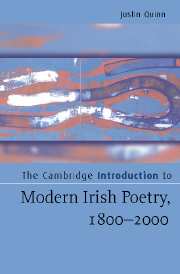Book contents
- Frontmatter
- Contents
- Acknowledgements
- Introduction
- 1 The appearance of Ireland
- 2 Tennyson's Ireland
- 3 Revival
- 4 W. B. Yeats
- 5 Wild earth
- 6 The ends of Modernism: Kinsella and Irish experiment
- 7 Ireland's Empire
- 8 Seamus Heaney
- 9 Irsko po Polsku: poetry and translation
- 10 Feminism and Irish poetry
- 11 Out of Ireland: Muldoon and other émigrés
- 12 The disappearance of Ireland
- Notes
- Guide to further reading
- Index
11 - Out of Ireland: Muldoon and other émigrés
Published online by Cambridge University Press: 05 June 2012
- Frontmatter
- Contents
- Acknowledgements
- Introduction
- 1 The appearance of Ireland
- 2 Tennyson's Ireland
- 3 Revival
- 4 W. B. Yeats
- 5 Wild earth
- 6 The ends of Modernism: Kinsella and Irish experiment
- 7 Ireland's Empire
- 8 Seamus Heaney
- 9 Irsko po Polsku: poetry and translation
- 10 Feminism and Irish poetry
- 11 Out of Ireland: Muldoon and other émigrés
- 12 The disappearance of Ireland
- Notes
- Guide to further reading
- Index
Summary
Aleš Debeljak has written of the ways that America affects a poet from a country the size of his own Slovenia. Its literary community is small, and its borders are maintained, more or less, by its language: the world is split into poetry which is Slovene and non-Slovene (but with some obvious overlaps with surrounding countries). The poet's place in this literary heritage will be designated to a large degree by his use of cultural signifiers to which his Slovene audience will respond immediately. However, when a Slovene poet travels to America he must introduce not only his own poetry but his country, as well as the particular pressures and freedoms of its poetic tradition, to a largely unknowledgeable audience. This might seem an onerous task, but for some poets it offers the opportunity of self-reinvention: the bulk of their imaginative energies is no longer expended in communicating within Slovene culture, but in presenting that culture in its totality to an outsider. For poets such as Tomaž Šalamun and Debeljak himself this has been an enabling experience which transformed their poetry.
The analogy with Irish poets in America holds up to a certain point. When Yeats was short of money, he would invariably consider a lucrative American lecture tour. (The financial lure of the USA for foreign writers remains fundamental to the cultural transaction.) On completing his lecture tour in 1903–4, he returned to Ireland with more than an expensive fur coat.
- Type
- Chapter
- Information
- The Cambridge Introduction to Modern Irish Poetry, 1800–2000 , pp. 175 - 193Publisher: Cambridge University PressPrint publication year: 2008



